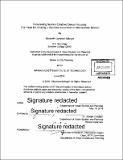Forecasting service-enriched senior housing : the case for housing + services innovation in Metropolitan Boston
Author(s)
Selinger, Elizabeth Campbell
DownloadFull printable version (29.92Mb)
Alternative title
Case for housing and services innovation in Metropolitan Boston
Other Contributors
Massachusetts Institute of Technology. Department of Urban Studies and Planning.
Advisor
Joseph Coughlin.
Terms of use
Metadata
Show full item recordAbstract
According to the Urban Institute, "explosion in senior households by 2030 demands housing and community adaptations." Service-enriched housing is part of a national conversation about the looming cost burden to care for the "silver tsunami."Without a solution for long-term care, many seniors, including moderate-income seniors, will "spend down" to Medicaid income and asset eligibility and require not only Medicaid funds but also subsidized housing. Homelessness rates among seniors are expected to increase substantially. 'The Massachusetts state budget is particularly at risk because nursing homes (paid for by Medicaid) are an entitlement while home care is not. Service-enriched housing could unlock the tight housing market in Greater Boston that is crowding out young families. All of the additional public entitlement funds that will be channeled to seniors will crowd out national and state spending on infrastructure, education and other priorities. This study seeks to advance the availability of service-enriched housing in Greater Boston with a particular emphasis on the expansion of subsidized service-enriched housing that integrates public Long Term Support Services (LTSS) programs. Early research demonstrates that service-enriched housing results in positive health outcomes for seniors as well as cost savings for Medicare and Medicaid. This study aligns the interests of seniors and key stakeholders in the housing sector and the Long Term Support Services (LTSS) sector in "options charts" to identify opportunities for reform. To create a baseline census of service-enriched housing from which to develop further, data on the existing and projected supply and demand for service-enriched housing is presented for specific municipalities in Metro Boston. In the 15 municipalities with complete data, there is an enormous unmet need for 22,894 units of service-enriched housing by 2030 of which there is unmet need for 10,941 units of subsidized housing. Study recommendations call for increasing the overall supply of service-enriched housing and also reforming the availability of LTSS in existing housing. In order to build more robust models for calculating these projected shortfalls, the gaps in the data, which present challenges for proper forecasting are described, and future research opportunities are suggested.
Description
Thesis: M.C.P., Massachusetts Institute of Technology, Department of Urban Studies and Planning, 2016. Cataloged from PDF version of thesis. Includes bibliographical references (pages 111-117).
Date issued
2016Department
Massachusetts Institute of Technology. Department of Urban Studies and PlanningPublisher
Massachusetts Institute of Technology
Keywords
Urban Studies and Planning.